Orientation for Success: Reflective Learning, Feedback & Assessment
VerifiedAdded on 2023/06/18
|8
|1870
|129
Essay
AI Summary
This essay explores reflective learning as a crucial element for success in higher education, emphasizing its role in developing critical thinking skills and enhancing future formative assessments. It highlights the benefits of reflective learning, such as improved teacher-student relationships, enhanced problem-solving abilities, and professional growth. The essay discusses the Gibbs model as a framework for structuring reflective practices, outlining its six stages: description, feelings, evaluation, analysis, conclusion, and action plan. It also examines the nature of feedback and feedforward, emphasizing their importance in improving student performance. The essay concludes by highlighting how a reflective approach to feedback and feedforward can enhance formative and summative assessments, ultimately contributing to a more developmental learning experience. Desklib provides access to a wealth of study tools, including past papers and solved assignments, to support students in their academic journey.
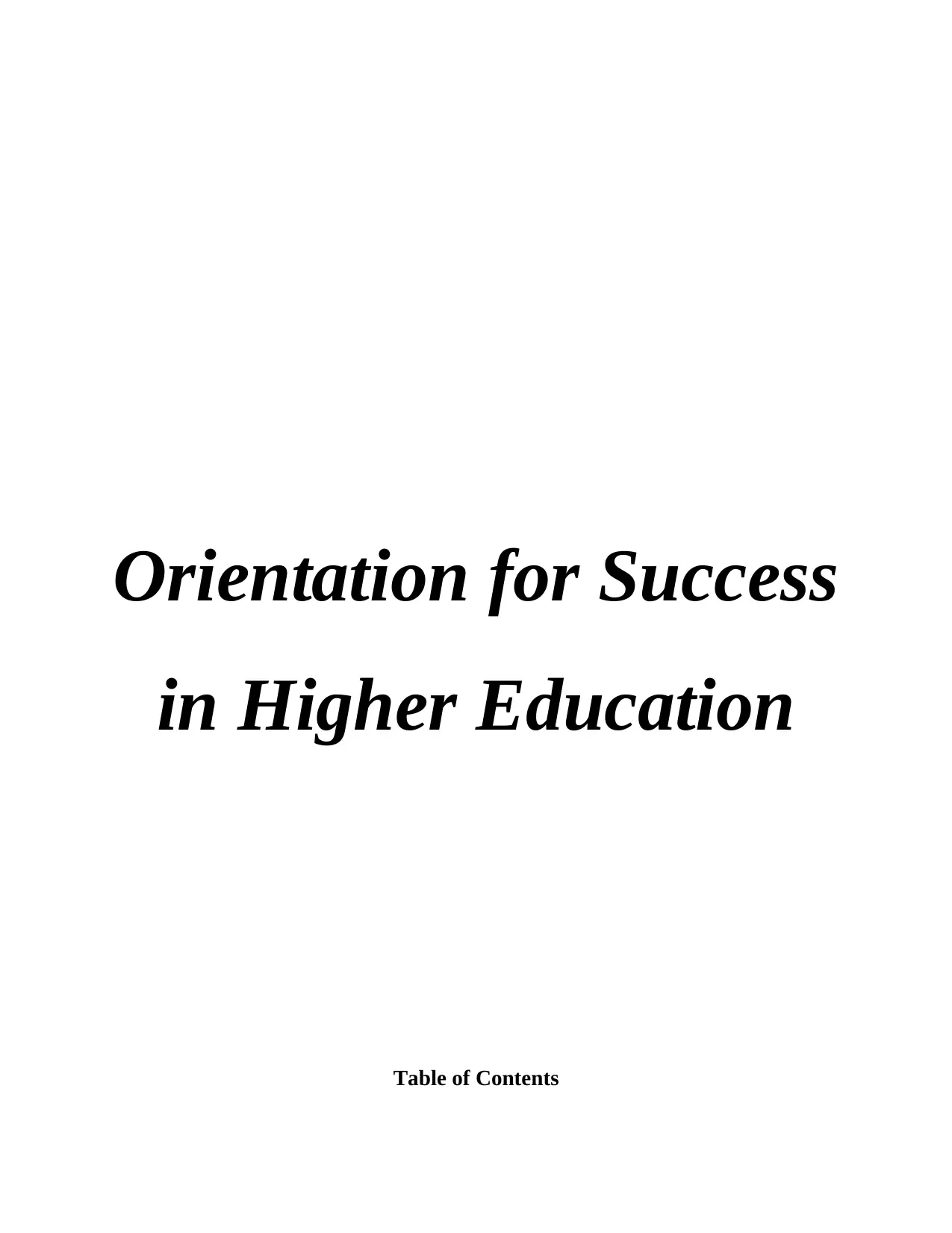
Orientation for Success
in Higher Education
Table of Contents
in Higher Education
Table of Contents
Paraphrase This Document
Need a fresh take? Get an instant paraphrase of this document with our AI Paraphraser
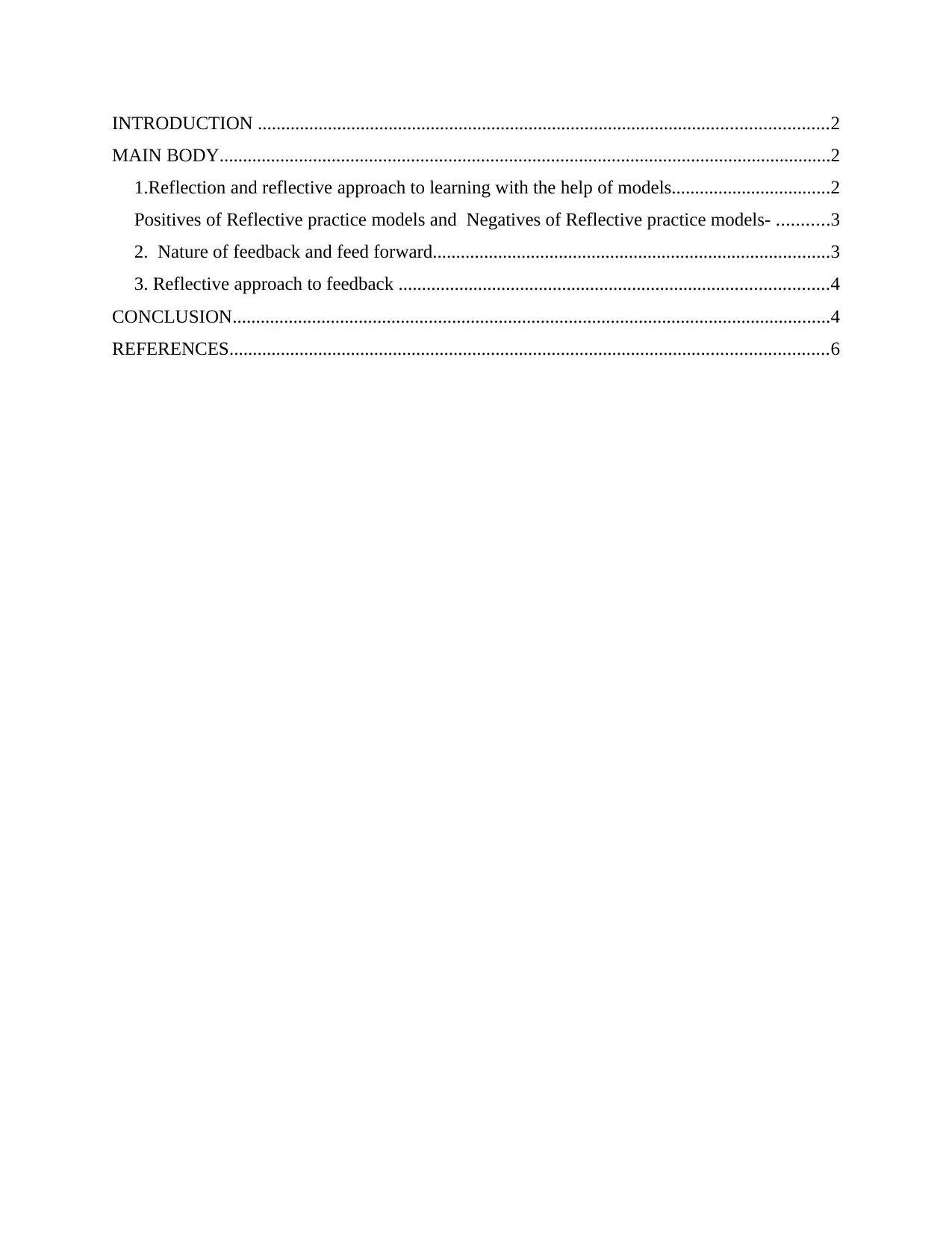
INTRODUCTION ..........................................................................................................................2
MAIN BODY...................................................................................................................................2
1.Reflection and reflective approach to learning with the help of models..................................2
Positives of Reflective practice models and Negatives of Reflective practice models- ...........3
2. Nature of feedback and feed forward.....................................................................................3
3. Reflective approach to feedback ............................................................................................4
CONCLUSION................................................................................................................................4
REFERENCES................................................................................................................................6
MAIN BODY...................................................................................................................................2
1.Reflection and reflective approach to learning with the help of models..................................2
Positives of Reflective practice models and Negatives of Reflective practice models- ...........3
2. Nature of feedback and feed forward.....................................................................................3
3. Reflective approach to feedback ............................................................................................4
CONCLUSION................................................................................................................................4
REFERENCES................................................................................................................................6

1
⊘ This is a preview!⊘
Do you want full access?
Subscribe today to unlock all pages.

Trusted by 1+ million students worldwide
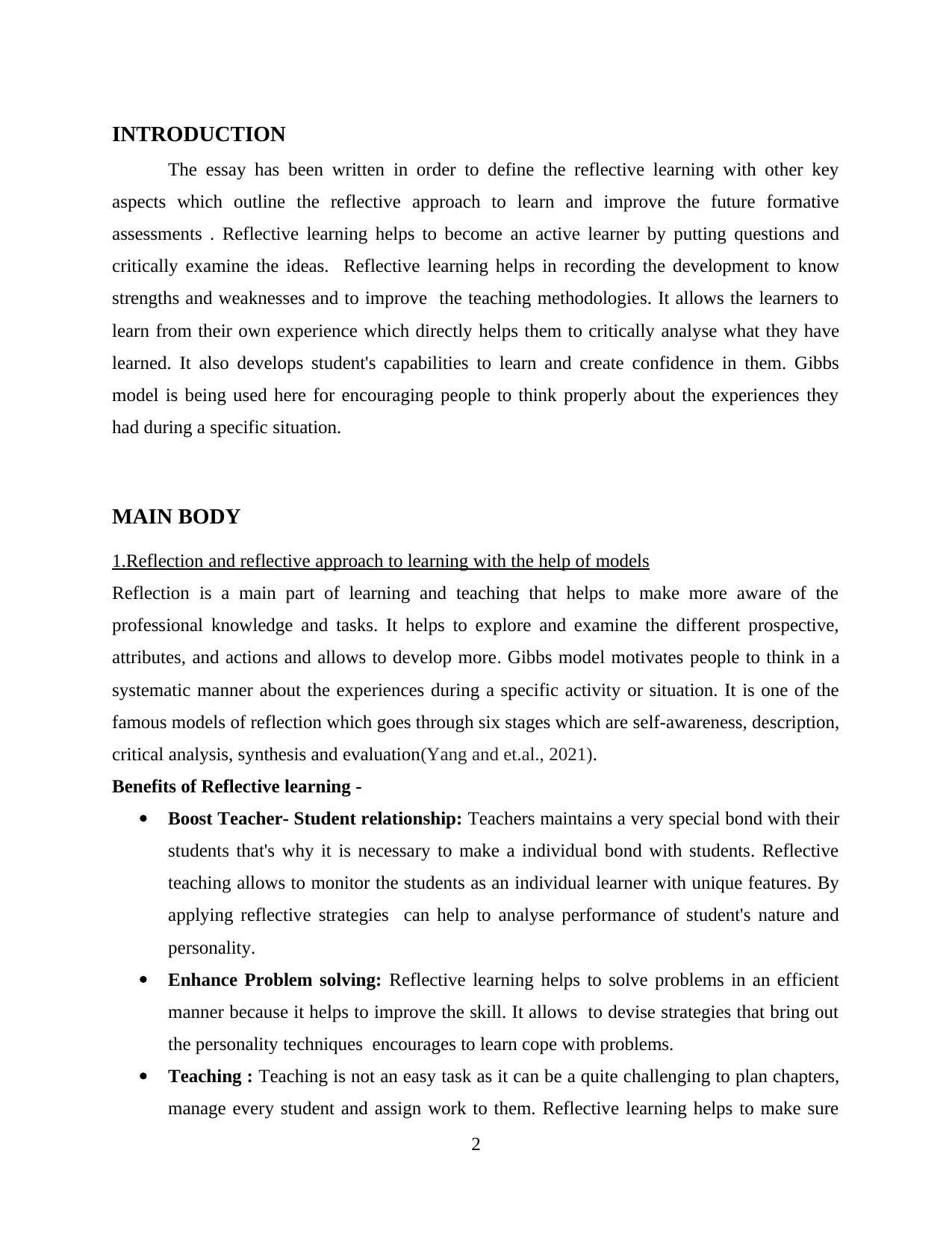
INTRODUCTION
The essay has been written in order to define the reflective learning with other key
aspects which outline the reflective approach to learn and improve the future formative
assessments . Reflective learning helps to become an active learner by putting questions and
critically examine the ideas. Reflective learning helps in recording the development to know
strengths and weaknesses and to improve the teaching methodologies. It allows the learners to
learn from their own experience which directly helps them to critically analyse what they have
learned. It also develops student's capabilities to learn and create confidence in them. Gibbs
model is being used here for encouraging people to think properly about the experiences they
had during a specific situation.
MAIN BODY
1.Reflection and reflective approach to learning with the help of models
Reflection is a main part of learning and teaching that helps to make more aware of the
professional knowledge and tasks. It helps to explore and examine the different prospective,
attributes, and actions and allows to develop more. Gibbs model motivates people to think in a
systematic manner about the experiences during a specific activity or situation. It is one of the
famous models of reflection which goes through six stages which are self-awareness, description,
critical analysis, synthesis and evaluation(Yang and et.al., 2021).
Benefits of Reflective learning -
Boost Teacher- Student relationship: Teachers maintains a very special bond with their
students that's why it is necessary to make a individual bond with students. Reflective
teaching allows to monitor the students as an individual learner with unique features. By
applying reflective strategies can help to analyse performance of student's nature and
personality.
Enhance Problem solving: Reflective learning helps to solve problems in an efficient
manner because it helps to improve the skill. It allows to devise strategies that bring out
the personality techniques encourages to learn cope with problems.
Teaching : Teaching is not an easy task as it can be a quite challenging to plan chapters,
manage every student and assign work to them. Reflective learning helps to make sure
2
The essay has been written in order to define the reflective learning with other key
aspects which outline the reflective approach to learn and improve the future formative
assessments . Reflective learning helps to become an active learner by putting questions and
critically examine the ideas. Reflective learning helps in recording the development to know
strengths and weaknesses and to improve the teaching methodologies. It allows the learners to
learn from their own experience which directly helps them to critically analyse what they have
learned. It also develops student's capabilities to learn and create confidence in them. Gibbs
model is being used here for encouraging people to think properly about the experiences they
had during a specific situation.
MAIN BODY
1.Reflection and reflective approach to learning with the help of models
Reflection is a main part of learning and teaching that helps to make more aware of the
professional knowledge and tasks. It helps to explore and examine the different prospective,
attributes, and actions and allows to develop more. Gibbs model motivates people to think in a
systematic manner about the experiences during a specific activity or situation. It is one of the
famous models of reflection which goes through six stages which are self-awareness, description,
critical analysis, synthesis and evaluation(Yang and et.al., 2021).
Benefits of Reflective learning -
Boost Teacher- Student relationship: Teachers maintains a very special bond with their
students that's why it is necessary to make a individual bond with students. Reflective
teaching allows to monitor the students as an individual learner with unique features. By
applying reflective strategies can help to analyse performance of student's nature and
personality.
Enhance Problem solving: Reflective learning helps to solve problems in an efficient
manner because it helps to improve the skill. It allows to devise strategies that bring out
the personality techniques encourages to learn cope with problems.
Teaching : Teaching is not an easy task as it can be a quite challenging to plan chapters,
manage every student and assign work to them. Reflective learning helps to make sure
2
Paraphrase This Document
Need a fresh take? Get an instant paraphrase of this document with our AI Paraphraser
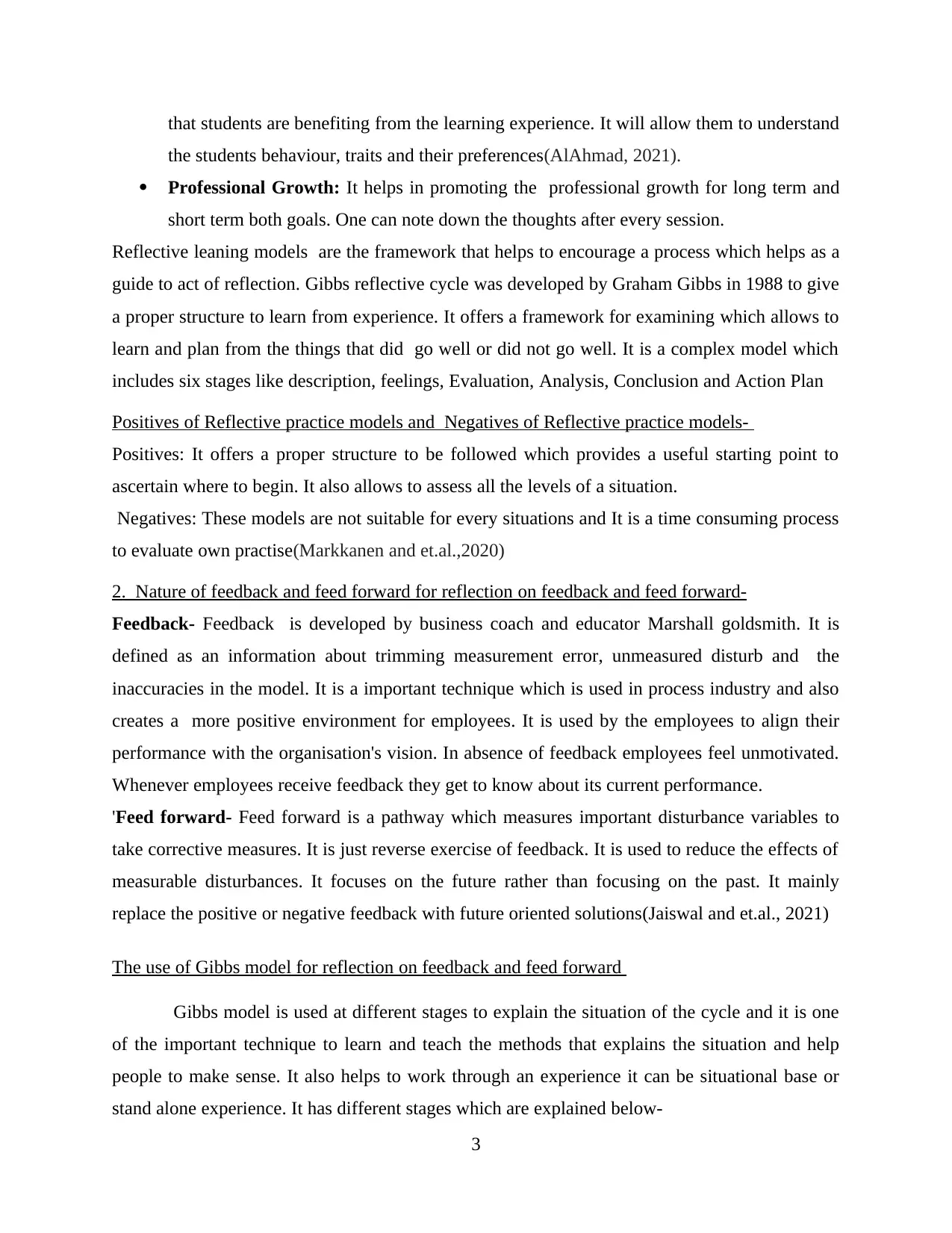
that students are benefiting from the learning experience. It will allow them to understand
the students behaviour, traits and their preferences(AlAhmad, 2021).
Professional Growth: It helps in promoting the professional growth for long term and
short term both goals. One can note down the thoughts after every session.
Reflective leaning models are the framework that helps to encourage a process which helps as a
guide to act of reflection. Gibbs reflective cycle was developed by Graham Gibbs in 1988 to give
a proper structure to learn from experience. It offers a framework for examining which allows to
learn and plan from the things that did go well or did not go well. It is a complex model which
includes six stages like description, feelings, Evaluation, Analysis, Conclusion and Action Plan
Positives of Reflective practice models and Negatives of Reflective practice models-
Positives: It offers a proper structure to be followed which provides a useful starting point to
ascertain where to begin. It also allows to assess all the levels of a situation.
Negatives: These models are not suitable for every situations and It is a time consuming process
to evaluate own practise(Markkanen and et.al.,2020)
2. Nature of feedback and feed forward for reflection on feedback and feed forward-
Feedback- Feedback is developed by business coach and educator Marshall goldsmith. It is
defined as an information about trimming measurement error, unmeasured disturb and the
inaccuracies in the model. It is a important technique which is used in process industry and also
creates a more positive environment for employees. It is used by the employees to align their
performance with the organisation's vision. In absence of feedback employees feel unmotivated.
Whenever employees receive feedback they get to know about its current performance.
'Feed forward- Feed forward is a pathway which measures important disturbance variables to
take corrective measures. It is just reverse exercise of feedback. It is used to reduce the effects of
measurable disturbances. It focuses on the future rather than focusing on the past. It mainly
replace the positive or negative feedback with future oriented solutions(Jaiswal and et.al., 2021)
The use of Gibbs model for reflection on feedback and feed forward
Gibbs model is used at different stages to explain the situation of the cycle and it is one
of the important technique to learn and teach the methods that explains the situation and help
people to make sense. It also helps to work through an experience it can be situational base or
stand alone experience. It has different stages which are explained below-
3
the students behaviour, traits and their preferences(AlAhmad, 2021).
Professional Growth: It helps in promoting the professional growth for long term and
short term both goals. One can note down the thoughts after every session.
Reflective leaning models are the framework that helps to encourage a process which helps as a
guide to act of reflection. Gibbs reflective cycle was developed by Graham Gibbs in 1988 to give
a proper structure to learn from experience. It offers a framework for examining which allows to
learn and plan from the things that did go well or did not go well. It is a complex model which
includes six stages like description, feelings, Evaluation, Analysis, Conclusion and Action Plan
Positives of Reflective practice models and Negatives of Reflective practice models-
Positives: It offers a proper structure to be followed which provides a useful starting point to
ascertain where to begin. It also allows to assess all the levels of a situation.
Negatives: These models are not suitable for every situations and It is a time consuming process
to evaluate own practise(Markkanen and et.al.,2020)
2. Nature of feedback and feed forward for reflection on feedback and feed forward-
Feedback- Feedback is developed by business coach and educator Marshall goldsmith. It is
defined as an information about trimming measurement error, unmeasured disturb and the
inaccuracies in the model. It is a important technique which is used in process industry and also
creates a more positive environment for employees. It is used by the employees to align their
performance with the organisation's vision. In absence of feedback employees feel unmotivated.
Whenever employees receive feedback they get to know about its current performance.
'Feed forward- Feed forward is a pathway which measures important disturbance variables to
take corrective measures. It is just reverse exercise of feedback. It is used to reduce the effects of
measurable disturbances. It focuses on the future rather than focusing on the past. It mainly
replace the positive or negative feedback with future oriented solutions(Jaiswal and et.al., 2021)
The use of Gibbs model for reflection on feedback and feed forward
Gibbs model is used at different stages to explain the situation of the cycle and it is one
of the important technique to learn and teach the methods that explains the situation and help
people to make sense. It also helps to work through an experience it can be situational base or
stand alone experience. It has different stages which are explained below-
3
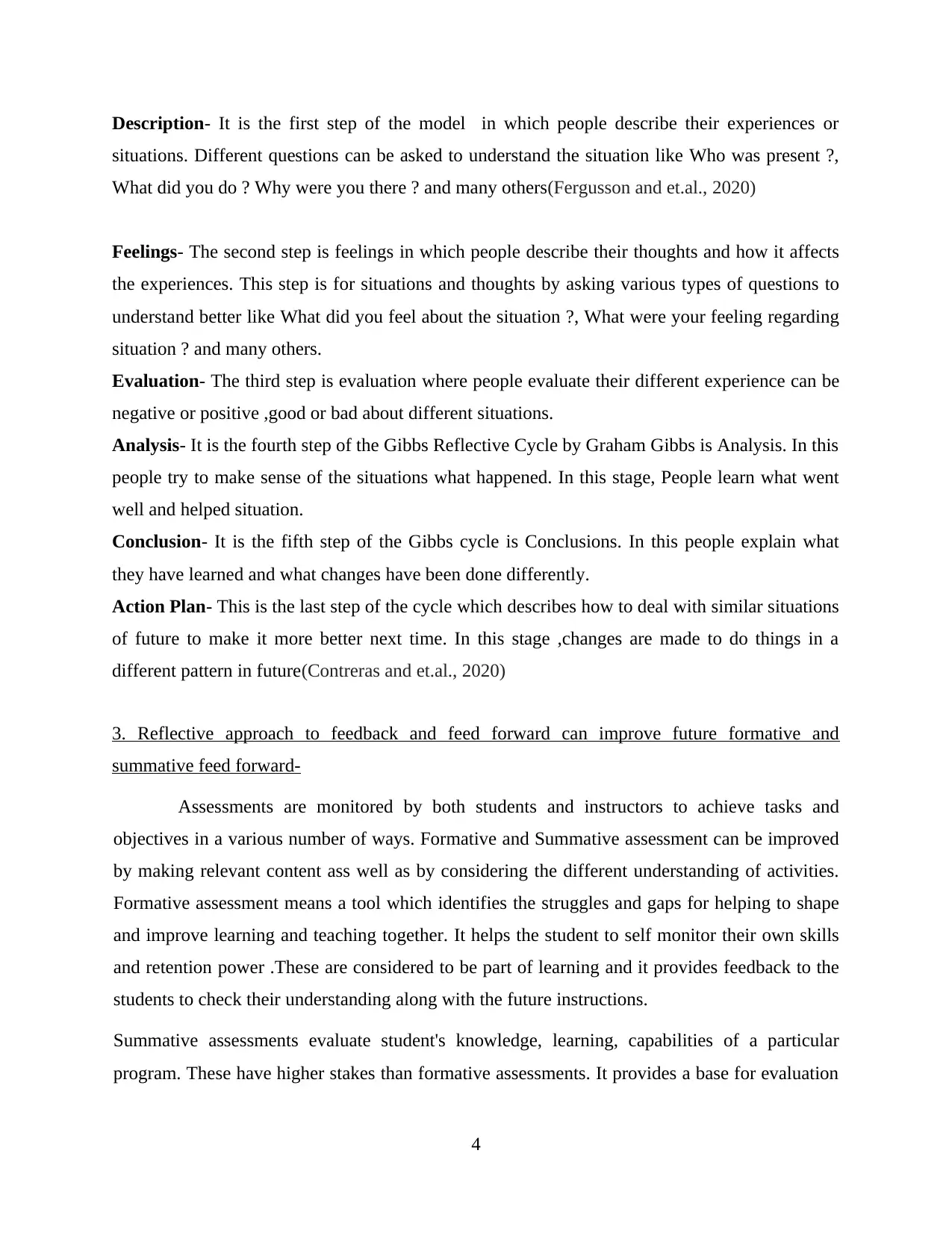
Description- It is the first step of the model in which people describe their experiences or
situations. Different questions can be asked to understand the situation like Who was present ?,
What did you do ? Why were you there ? and many others(Fergusson and et.al., 2020)
Feelings- The second step is feelings in which people describe their thoughts and how it affects
the experiences. This step is for situations and thoughts by asking various types of questions to
understand better like What did you feel about the situation ?, What were your feeling regarding
situation ? and many others.
Evaluation- The third step is evaluation where people evaluate their different experience can be
negative or positive ,good or bad about different situations.
Analysis- It is the fourth step of the Gibbs Reflective Cycle by Graham Gibbs is Analysis. In this
people try to make sense of the situations what happened. In this stage, People learn what went
well and helped situation.
Conclusion- It is the fifth step of the Gibbs cycle is Conclusions. In this people explain what
they have learned and what changes have been done differently.
Action Plan- This is the last step of the cycle which describes how to deal with similar situations
of future to make it more better next time. In this stage ,changes are made to do things in a
different pattern in future(Contreras and et.al., 2020)
3. Reflective approach to feedback and feed forward can improve future formative and
summative feed forward-
Assessments are monitored by both students and instructors to achieve tasks and
objectives in a various number of ways. Formative and Summative assessment can be improved
by making relevant content ass well as by considering the different understanding of activities.
Formative assessment means a tool which identifies the struggles and gaps for helping to shape
and improve learning and teaching together. It helps the student to self monitor their own skills
and retention power .These are considered to be part of learning and it provides feedback to the
students to check their understanding along with the future instructions.
Summative assessments evaluate student's knowledge, learning, capabilities of a particular
program. These have higher stakes than formative assessments. It provides a base for evaluation
4
situations. Different questions can be asked to understand the situation like Who was present ?,
What did you do ? Why were you there ? and many others(Fergusson and et.al., 2020)
Feelings- The second step is feelings in which people describe their thoughts and how it affects
the experiences. This step is for situations and thoughts by asking various types of questions to
understand better like What did you feel about the situation ?, What were your feeling regarding
situation ? and many others.
Evaluation- The third step is evaluation where people evaluate their different experience can be
negative or positive ,good or bad about different situations.
Analysis- It is the fourth step of the Gibbs Reflective Cycle by Graham Gibbs is Analysis. In this
people try to make sense of the situations what happened. In this stage, People learn what went
well and helped situation.
Conclusion- It is the fifth step of the Gibbs cycle is Conclusions. In this people explain what
they have learned and what changes have been done differently.
Action Plan- This is the last step of the cycle which describes how to deal with similar situations
of future to make it more better next time. In this stage ,changes are made to do things in a
different pattern in future(Contreras and et.al., 2020)
3. Reflective approach to feedback and feed forward can improve future formative and
summative feed forward-
Assessments are monitored by both students and instructors to achieve tasks and
objectives in a various number of ways. Formative and Summative assessment can be improved
by making relevant content ass well as by considering the different understanding of activities.
Formative assessment means a tool which identifies the struggles and gaps for helping to shape
and improve learning and teaching together. It helps the student to self monitor their own skills
and retention power .These are considered to be part of learning and it provides feedback to the
students to check their understanding along with the future instructions.
Summative assessments evaluate student's knowledge, learning, capabilities of a particular
program. These have higher stakes than formative assessments. It provides a base for evaluation
4
⊘ This is a preview!⊘
Do you want full access?
Subscribe today to unlock all pages.

Trusted by 1+ million students worldwide
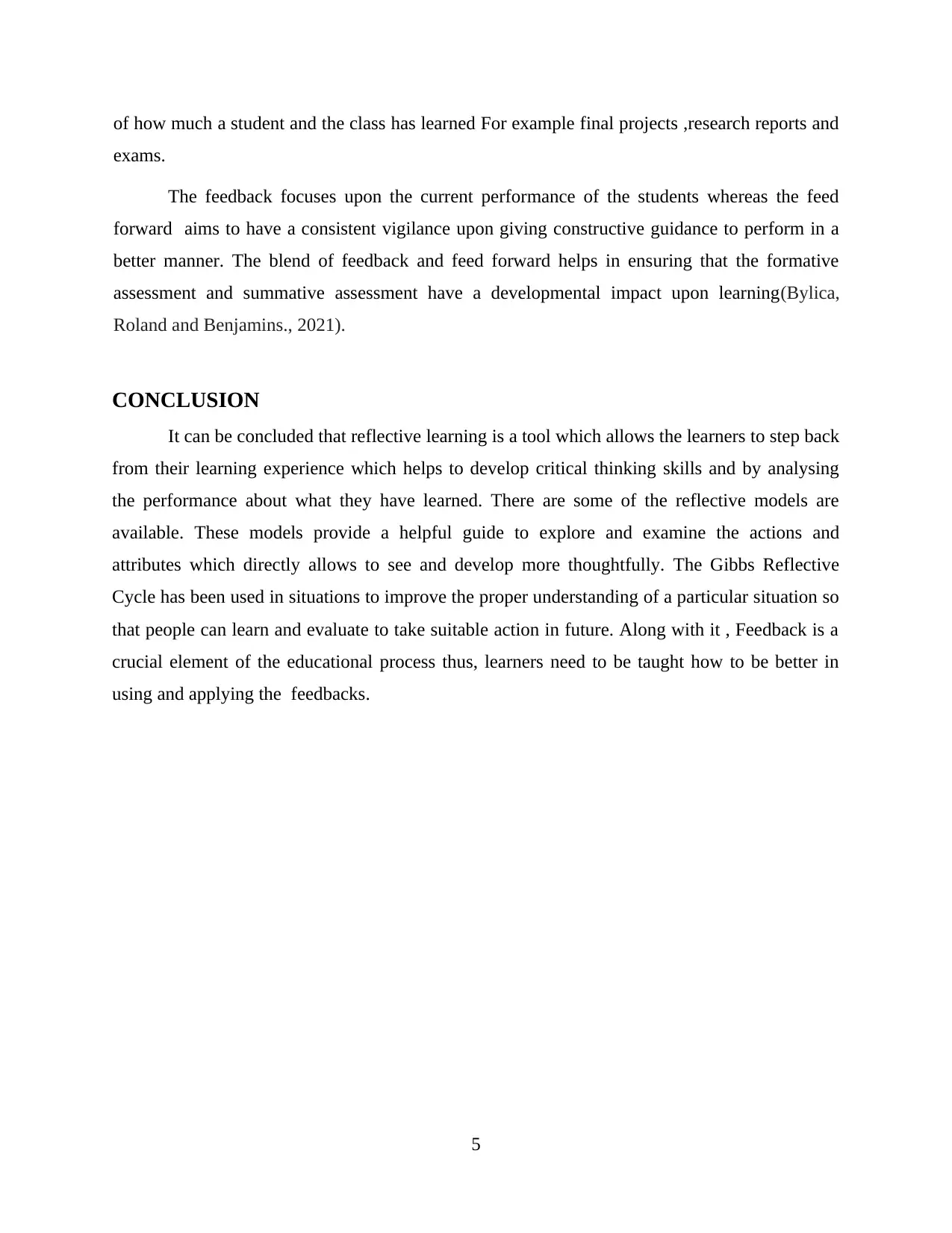
of how much a student and the class has learned For example final projects ,research reports and
exams.
The feedback focuses upon the current performance of the students whereas the feed
forward aims to have a consistent vigilance upon giving constructive guidance to perform in a
better manner. The blend of feedback and feed forward helps in ensuring that the formative
assessment and summative assessment have a developmental impact upon learning(Bylica,
Roland and Benjamins., 2021).
CONCLUSION
It can be concluded that reflective learning is a tool which allows the learners to step back
from their learning experience which helps to develop critical thinking skills and by analysing
the performance about what they have learned. There are some of the reflective models are
available. These models provide a helpful guide to explore and examine the actions and
attributes which directly allows to see and develop more thoughtfully. The Gibbs Reflective
Cycle has been used in situations to improve the proper understanding of a particular situation so
that people can learn and evaluate to take suitable action in future. Along with it , Feedback is a
crucial element of the educational process thus, learners need to be taught how to be better in
using and applying the feedbacks.
5
exams.
The feedback focuses upon the current performance of the students whereas the feed
forward aims to have a consistent vigilance upon giving constructive guidance to perform in a
better manner. The blend of feedback and feed forward helps in ensuring that the formative
assessment and summative assessment have a developmental impact upon learning(Bylica,
Roland and Benjamins., 2021).
CONCLUSION
It can be concluded that reflective learning is a tool which allows the learners to step back
from their learning experience which helps to develop critical thinking skills and by analysing
the performance about what they have learned. There are some of the reflective models are
available. These models provide a helpful guide to explore and examine the actions and
attributes which directly allows to see and develop more thoughtfully. The Gibbs Reflective
Cycle has been used in situations to improve the proper understanding of a particular situation so
that people can learn and evaluate to take suitable action in future. Along with it , Feedback is a
crucial element of the educational process thus, learners need to be taught how to be better in
using and applying the feedbacks.
5
Paraphrase This Document
Need a fresh take? Get an instant paraphrase of this document with our AI Paraphraser
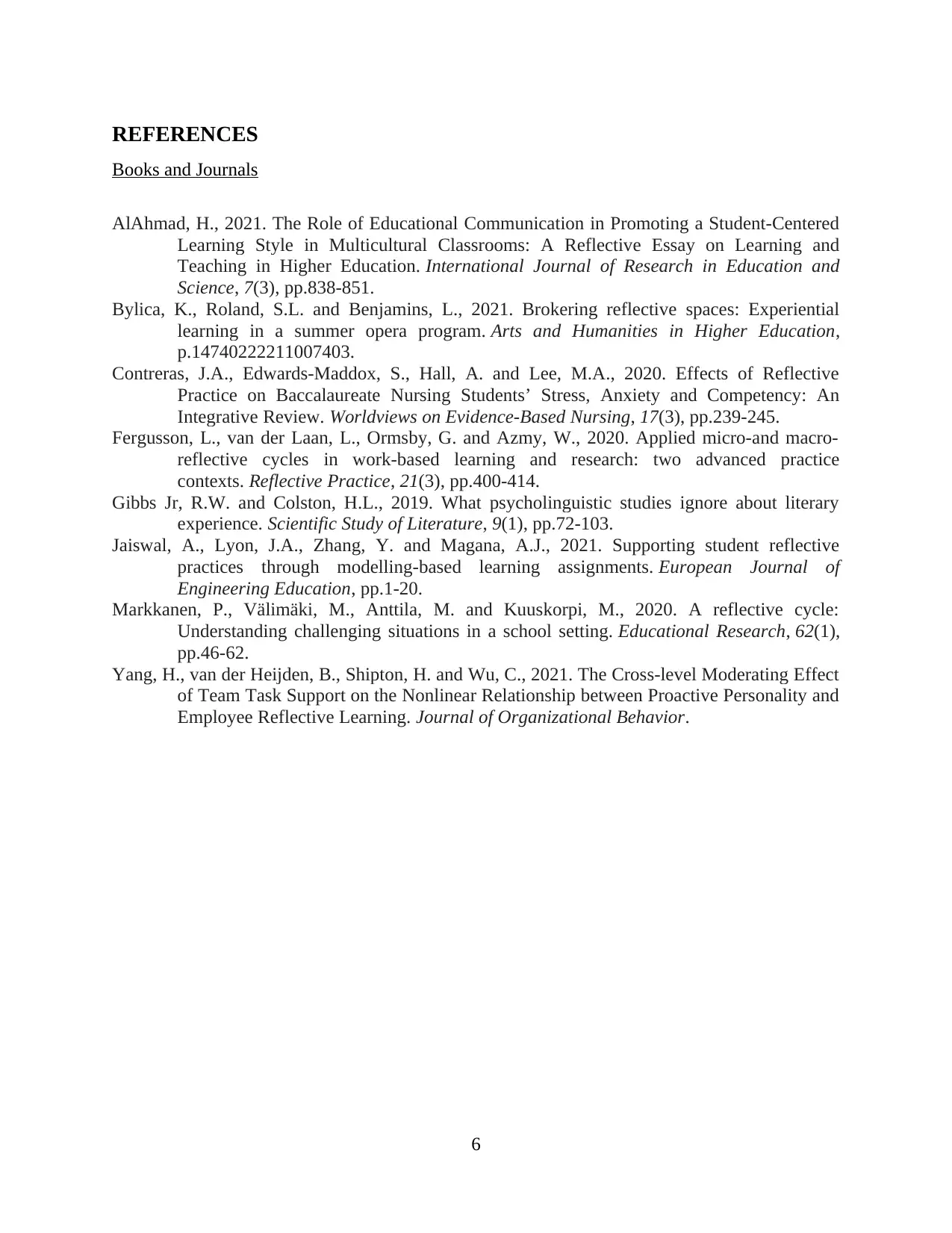
REFERENCES
Books and Journals
AlAhmad, H., 2021. The Role of Educational Communication in Promoting a Student-Centered
Learning Style in Multicultural Classrooms: A Reflective Essay on Learning and
Teaching in Higher Education. International Journal of Research in Education and
Science, 7(3), pp.838-851.
Bylica, K., Roland, S.L. and Benjamins, L., 2021. Brokering reflective spaces: Experiential
learning in a summer opera program. Arts and Humanities in Higher Education,
p.14740222211007403.
Contreras, J.A., Edwards‐Maddox, S., Hall, A. and Lee, M.A., 2020. Effects of Reflective
Practice on Baccalaureate Nursing Students’ Stress, Anxiety and Competency: An
Integrative Review. Worldviews on Evidence‐Based Nursing, 17(3), pp.239-245.
Fergusson, L., van der Laan, L., Ormsby, G. and Azmy, W., 2020. Applied micro-and macro-
reflective cycles in work-based learning and research: two advanced practice
contexts. Reflective Practice, 21(3), pp.400-414.
Gibbs Jr, R.W. and Colston, H.L., 2019. What psycholinguistic studies ignore about literary
experience. Scientific Study of Literature, 9(1), pp.72-103.
Jaiswal, A., Lyon, J.A., Zhang, Y. and Magana, A.J., 2021. Supporting student reflective
practices through modelling-based learning assignments. European Journal of
Engineering Education, pp.1-20.
Markkanen, P., Välimäki, M., Anttila, M. and Kuuskorpi, M., 2020. A reflective cycle:
Understanding challenging situations in a school setting. Educational Research, 62(1),
pp.46-62.
Yang, H., van der Heijden, B., Shipton, H. and Wu, C., 2021. The Cross‐level Moderating Effect
of Team Task Support on the Nonlinear Relationship between Proactive Personality and
Employee Reflective Learning. Journal of Organizational Behavior.
6
Books and Journals
AlAhmad, H., 2021. The Role of Educational Communication in Promoting a Student-Centered
Learning Style in Multicultural Classrooms: A Reflective Essay on Learning and
Teaching in Higher Education. International Journal of Research in Education and
Science, 7(3), pp.838-851.
Bylica, K., Roland, S.L. and Benjamins, L., 2021. Brokering reflective spaces: Experiential
learning in a summer opera program. Arts and Humanities in Higher Education,
p.14740222211007403.
Contreras, J.A., Edwards‐Maddox, S., Hall, A. and Lee, M.A., 2020. Effects of Reflective
Practice on Baccalaureate Nursing Students’ Stress, Anxiety and Competency: An
Integrative Review. Worldviews on Evidence‐Based Nursing, 17(3), pp.239-245.
Fergusson, L., van der Laan, L., Ormsby, G. and Azmy, W., 2020. Applied micro-and macro-
reflective cycles in work-based learning and research: two advanced practice
contexts. Reflective Practice, 21(3), pp.400-414.
Gibbs Jr, R.W. and Colston, H.L., 2019. What psycholinguistic studies ignore about literary
experience. Scientific Study of Literature, 9(1), pp.72-103.
Jaiswal, A., Lyon, J.A., Zhang, Y. and Magana, A.J., 2021. Supporting student reflective
practices through modelling-based learning assignments. European Journal of
Engineering Education, pp.1-20.
Markkanen, P., Välimäki, M., Anttila, M. and Kuuskorpi, M., 2020. A reflective cycle:
Understanding challenging situations in a school setting. Educational Research, 62(1),
pp.46-62.
Yang, H., van der Heijden, B., Shipton, H. and Wu, C., 2021. The Cross‐level Moderating Effect
of Team Task Support on the Nonlinear Relationship between Proactive Personality and
Employee Reflective Learning. Journal of Organizational Behavior.
6
1 out of 8
Related Documents
Your All-in-One AI-Powered Toolkit for Academic Success.
+13062052269
info@desklib.com
Available 24*7 on WhatsApp / Email
![[object Object]](/_next/static/media/star-bottom.7253800d.svg)
Unlock your academic potential
Copyright © 2020–2026 A2Z Services. All Rights Reserved. Developed and managed by ZUCOL.



